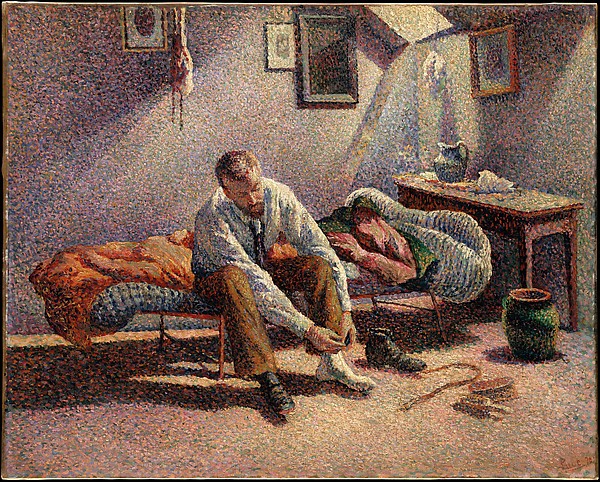In my post on the Switch of Nature, I contended that cynicism constitutes one of the greatest threats to manliness. There were a couple of comments in reply which argued that cynicism is not wholly unhealthy. And I agree; I did not mean that cynicism is always bad, rather that it is bad in unhealthy amounts. This selection, from a century’s old Atlantic Monthly article, does a nice job of explaining the need for balancing the strengths and weaknesses of this characteristic.
From “CYNICISM,” 1904
By Arthur Stanwood Pier
One of the seeming waywardnesses of our human nature is the respect for a cynic that lurks in nearly every heart. The respect is not for his character, certainly not for his disposition; but it goes out to him as a man of intellect, and is often disproportionate to his ability. To hear that a man is cynical is to accept him as of superior intelligence. There is a universal deference to what is universally deemed an unlovely and undesirable attitude of mind. The entrance of the cynic into the drawing-room produces an air of expectant interest; his rancorous comments are received as admirable wit. So, at least, according to the contemporary novels of society; so, even, — though in a somewhat less obvious and artificial manner,—according to one’s own observation. We all find more interesting the person who discusses his friend’s failings than him who dwells upon his friend’s virtues. We do not like the cynic better, but we regard him as the more penetrating and the better informed.
Hence we find him excellent company. For instance: Brown takes pains to make a pleasant impression on those whom he meets, and, in the ordinary relations of life, gets on with his acquaintances and friends very comfortably. When, therefore, the cynical observer shrugs his shoulders and intimates something to Brown’s discredit, the idea has for those who know Brown the charm of novelty, and adorns him with a new interest. Having never before held him in discredit, they feel that his detractor has got below the surface. The conviction is strengthened by the cynic’s air of mental reservation, his unwillingness to utter definitely what he knows, his manner that implies, “Oh yes, all very well, but I could tell things if I would.”
This, however, is not the only cause that contributes to the general deference. If one man declares a person to be charming, fascinating, or delightful, and another pronounces him disgusting, repulsive, or intolerable, who makes the more profound impression? The language of enthusiasm is emasculate compared with that of hatred or contempt. A sufficient reason for the undemonstrative nature of the English-speaking race lies in the effeminate quality of the adjectives that denote admirable traits. Some of them can hardly be uttered without a consciousness of a loss of virility. One has only to contrast with them the hearty gusto of our vocabulary of dislike and depreciation to perceive the tremendous advantage that the cynic enjoys.
His very name supports his pretensions to a superior intelligence. “Cynic,” for all that it meant originally “doglike,” is an aristocratic word. One is not prone to think of coal heavers, sailors, miners, as cynics; it has probably occurred to but few that their grocers and butchers are cynics. The word is erudite and Greek; the presumption is that the man designated by a term of such distinguished lineage is of education and intelligence. We have a habit of deriving ideas in this illogical way. The cynics in the humbler walks of life are not regarded as cynics, but as men soured and disappointed. And when we hear of one that he is soured and disappointed, we do not instinctively pay tribute to his intelligence.
Is there, then, no wisdom in cynicism, no virtue in disbelief? Does the undoubted suggestion of intelligence which the word implies rest entirely upon such trivial and empty grounds? Unquestionably the inner respect which persists, notwithstanding the superficial condemnation, proceeds from a dim recognition of certain useful services that cynicism does perform. An attempt to discover these and set them forth fairly need not disturb even the most believing.
A reasonable cynicism affords recreation to the mind. A man may always, with advantage to his mental health, indulge in a cynicism as a hobby; he may, for instance, be cynical of women, or newspapers, or party politics, or the publishers of novels, and be the better for it. But he is in a serious state if his cynicism includes women and newspapers and party politics and the publishers of novels. Then, indeed, is his outlook bleak and barren, and in all probability he lives and works only to malign ends.
Nearly all sane, normal people, however, enjoy one cynicism by way of diversion. It is, indeed, essential to character to have some object at which to scoff, swear, or sneer. Cynicism is never a native quality of the mind; it always has its birth in some unhappy experience. The young man finds that the girl who has gathered up for him all the harmony and melody of earth rings hollow at the test; and he drops his lyrical language and becomes cynical of women. The citizen of Boston has naturally grown cynical of newspapers. The candidate for public office who has been definitely retired to private life by being “knifed” at the polls distrusts party politics. A man reads the advertisement of a novel, then reads the novel, and thenceforth is cynical of the publishers of novels.
Yet these misfortunes have their salutary aspect. The disappointed lover, generalizing bitterly upon the sex, is not always implacable; a cooler judgment tempers and restores his passion, gives it another object, and so guides him to a safer, if less gusty and emotional love. The citizen of Boston, the betrayed candidate, the misled and disappointed reader, all have for their condition, even though they know it not, a valuable compensation; for the very experience that has brought them to this pass of reasonable cynicism has stirred their indignation; yes, in spite of their seeming inertness, indignation is now smouldering. And this is a great force; slow though it may be to start the wheels of machinery, it is still an important fuel in keeping alive the fires under the boilers of civilization. The faculty of it becomes dulled by disuse, and is the more alert and righteous for a little rasping. How impressive and commanding a quality in a man is that of a great potential indignation! It is essential to the chieftain. He may never show more than the flash of an eye, yet that will serve. And such power of indignation never came to one who had not penetrated some large bland sham, and learned thereby to hate and disbelieve all its seductive kindred…
[Cynicism] is a means toward sturdiness and independence in a man; it quickens his activities, and prevents a too ready acceptance of existing conditions. It is almost necessary to important achievement. The reverential frame of mind is inefficient when confronted with the world’s work; too much in the problems of life demands not to be reverenced, but to be cursed. There can be no useful and permanent building up without a clearing of the site; old foundations and debris have to be swept away. The man of reverential mind, who has no touch of cynicism, is unfit for this work…
In one’s own experience it is not difficult to note the efficiency which a vein of cynicism, properly combined with other qualities, gives a man. Those who are regarded as successful, or as being on the road to success, are cheerful, hopeful persons, with just this slightly cynical outlook. Those who have failed, or are failing, are just as surely the utterly cynical, the decayed, querulous, and embittered, or the supremely reverential, who have too much respect for things as they are to undertake any alteration. These are the indolent; they may work hard all their lives, yet are they none the less indolent mentally, and unalert…
…one’s cynicism must always be tempered in its sentiment and limited in its scope. A man may profitably be cynical of women, yet his faith and loyalty to at least one woman — his mother, or his sister, or the woman he loves — must be unswerving and unquestioning. A man may not be cynical of children or with children. He cannot be cynical of friends and keep them. He must not grow cynical of himself, for then nothing remains.
And the danger of cynicism is that once admitted into a man it may grow, appropriating one after another of his channels and outlets, narrowing his hopes and enthusiasms, until finally it rots the man himself.
Tags: Manvotionals







